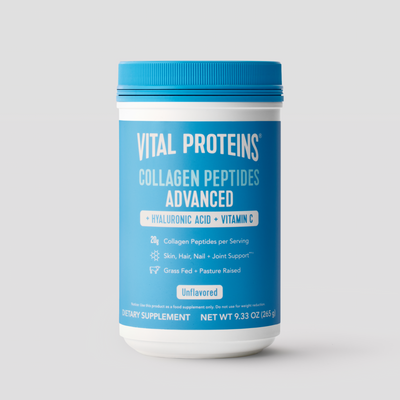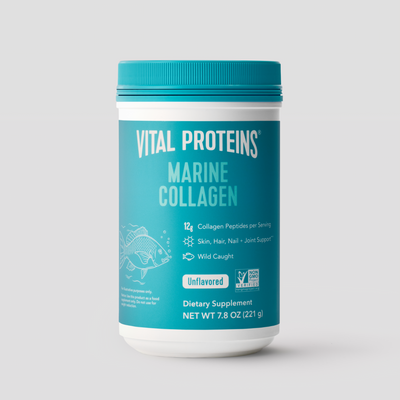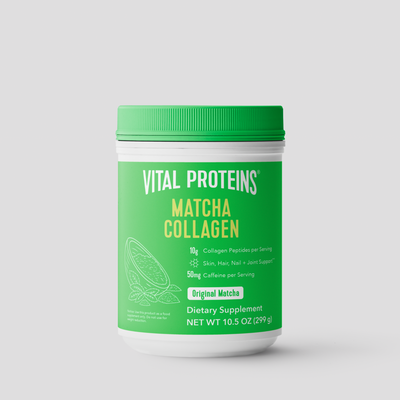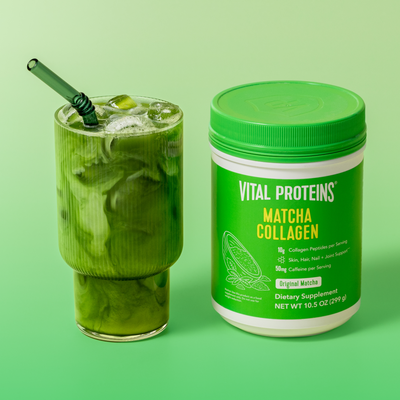What do the olive oil-rich Mediterranean diet, the meat-heavy South Beach diet, and a healthy vegan diet loaded with nuts and seeds have in common? Among other things, they all contain rich amounts of dietary fat. In case you missed the memo, current science shows that for decades, past diet trends were wrong about the need to avoid dietary fat.
You've likely heard of the ketogenic diet. Here's everything you need to know about the keto diet, and why you might consider making it a part of your lifestyle. You'll also learn about why you should add Vital Proteins® Collagen Peptides ($25; shop now) to your diet.
Vital Note: This article has been made available for informational and educational purposes only. It is not intended to be a substitute for professional medical advice, diagnosis, or treatment. Always seek the advice of your physician or another qualified health provider with any questions you may have regarding a medical condition. Your licensed healthcare professional can best provide you with the diagnosis and treatment of any medical condition and assist you as well in deciding whether a dietary supplement will be a helpful addition to your regimen.

WHAT IS THE KETO DIET?
First things first. Let's get to the basics. The ketogenic diet is extremely low in carbohydrates, allows for moderate protein intake, and consists largely of eating dietary fat. Generally speaking, it's a diet that's made up of 5 to 10 percent carbs, no more than 20 percent protein, and 60 to 80 percent fat.
As you can imagine, that protein limitation means that this diet isn't all about meat. That's what makes it different from other low-carb diets. Instead, a large portion of fat comes from non-meat sources, such as olive oil, avocados, eggs, coconut milk, nuts, seeds, coconut oil, olives, ghee, organic butter and lard. Non-starchy veggies like spinach, kale, and broccoli also play a major role in the ketogenic diet.
The argument behind the ketogenic diet is that when the body is deprived of carbohydrates, it switches from glucose-burning mode to fat-burning mode, of which ketones are a product. Ketones are then used for energy. As a result of having few carbohydrates to burn, the body burns through its fat stores, leading to fat loss.
But it's not exactly that simple. It can be hard to get your body into ketosis, causing your liver to produce ketones, which is fuel from stored fat. And, ketosis can put you at risk of health complications.
What does collagen do for keto?
Gut health is also a hot topic in the keto world. Because the keto diet doesn't doesn’t provide for any consumption of gluten or grains, it can be a great option for people sensitive to these foods. While some proponents utilize full-fat dairy on a ketogenic diet, others opt for fat sources such as olive oil and coconut oil instead, making this diet appropriate for people avoiding dairy for digestive reasons.
Collagen is an amazing protein to include in a ketogenic diet. Collagen is a protein found in the skin, bones and cartilage, and it can promote the healthy maintenance of these cells in our own bodies.** People eating keto will usually opt to include the skin, bones and cartilage in their meat sources, and they often drink bone broth — a rich source of collagen — to further promote gut function. This makes collagen a natural component of a ketogenic diet.
However, you can also add collagen into your ketogenic diet in the form of collagen peptides. Vital Proteins® Collagen Peptides are sourced from grass-fed, pasture-raised bovine. Other products in the Vital Proteins® lineup includeBoneBroth Collagen, which can be used to supplement delicious soups and stews, andMarine Collagen, which is suitable for pescatarians.
WHAT ARE THE BENEFITS OF THE KETO DIET?
According to proponents of the diet, eating keto may help regulate blood sugar and promote a healthy insulin response. And, restricting carb intake can lead to higher fat loss, but this is not a long-term health solution as our bodies need carbs to function.
Decreased brain fog is another benefit that's often reported with the keto diet, asstudies have found that ketones tend to be a fantastic fuel source for the brain.
However, it's important to note that only short-term effects of the keto diet have been studied and it's not clear if this diet is safe or healthy in the long-term.

Is the keto diet bad?
The keto diet is not for everyone. Foods you eat on this diet are high in saturated fats, according toHarvard Health. Additionally, carbs are not something that you should avoid as your body needs them for fuel, especially if you are active. And, you may miss out on other key nutrients in your diet by cutting down on fruits, veggies and whole grains. Like with any diet, eating restrictively for a short period of time will not have long-term benefits.
The bottom line: This diet is not for everyone and you should never try this diet without the guidance of a medical professional.



















